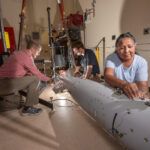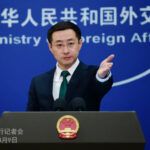A brighter future for Iranian nonproliferation?
By Farnaz Alimehri | June 28, 2016
Iran’s vice president and nuclear chief Ali Akbar Salehi paid a visit last month to the Czech Republic, where he met with several officials including Prime Minister Bohuslav Sobotka and Foreign Minister Lubomir Zaoralek. The purpose of the trip was to develop a bilateral nuclear cooperation between Iran and the Czech Republic, specifically aimed at bolstering Iran’s civilian nuclear program and the Iranian Nuclear Regulatory Authority.
While the regulatory authority already implements the framework and regulatory obligations required by the International Atomic Energy Agency, and its management system is based on the agency's safety standards, it appears that Iran is eager to work with European nations to help implement better standards. While in the Czech Republic, Salehi stated, “I was really astonished and bewildered by the level of the advancement of your scientists at this very sensitive and important technology,” and said that he hoped to gain insight into nuclear safety using the Czech experience. The Czech visit is one of several signs that Iran is sticking to its commitments under the international nuclear deal made last year.
Progress on implementation. The trip to the Czech Republic and Salehi’s statements to the press are positive steps for Iran to become more involved in international nonproliferation efforts. The events were scheduled one week after Iran released its first progress report on the implementation of the nuclear deal known as the Joint Comprehensive Plan of Action. In the report, Iran highlighted what it had accomplished since Implementation Day, including the reduction of centrifuges in the Natanz Fuel Enrichment Plant and the conversion of Fordow from a fuel enrichment facility to a research and development complex.
Salehi’s statements might also indicate that Iran is moving toward a more transparent civilian nuclear program. Critics in the West still doubt Iran’s commitment to the nuclear deal, claiming that Iran could quickly move to a weaponized nuclear program once the 15-year restrictions on enrichment have been lifted. Though it is difficult to say whether Iran would flout the deal, the country seems so far committed to the agreement and to other nonproliferation opportunities. Iran has complied with nearly two-thirds of the terms of the deal, and plans to check off additional obligations by the end of the year.
Moving forward. Given this meeting and others that have taken place within Iran, there are indications that the country is making strides to regain the trust of the international community with regard to nuclear safeguards. In addition to these public declarations, Iran should take additional measures to demonstrate its commitment to nonproliferation.
For example, Iran should move to adopt additional international treaties regarding nuclear safety and security. Out of six international measures, Iran has only adopted two: the Convention on Early Notification of a Nuclear Accident and the Convention on Assistance in the Case of a Nuclear Accident or Radiological Emergency. If Iran is as serious about nuclear security as it claims to be, it should also adopt the Convention on the Physical Protection of Nuclear Material, the 2005 Amendment to that Convention, the International Convention for the Suppression of Acts of Nuclear Terrorism, and the Convention on Nuclear Safety. The international community must also help Iran with the process of adopting these additional safety and security measures. For example, although Iran was not invited to the final Nuclear Security Summit in March 2016, Iran should be invited to participate in future meetings under the auspices of the International Atomic Energy Agency—not only as a reward for the nuclear deal, but also because nuclear security is an important issue for the country.
Additionally, Iran should seriously consider ratification of the Comprehensive Nuclear Test Ban Treaty, which it signed in 1996. Executive Secretary Lassina Zerbo of the Preparatory Commission for the Comprehensive Nuclear Test Ban Treaty Organization (CTBTO) stated last fall that if Iran did not ratify this treaty, “it would leave room for the doubt that people have put in [the nuclear] deal and the good intentions of Iran.”
As a first step, Iran could connect its auxiliary seismic stations, which are designed to detect underground nuclear explosions. If the stations were connected, Iran would then send the information they collect to the CTBTO. (The treaty has not been put fully into force, but the CTBTO is nevertheless actively monitoring the absence of nuclear tests worldwide.) However, Tehran has not yet signed the required activation agreements with the organization; one of the three seismic stations has been inactive since 2006, and the other two have yet to be fully constructed. Since the seismic monitors do not require Iran to disclose any sensitive information, completion and activation of these stations would honor the sentiments of the treaty without requiring Iran to fully commit politically. Furthermore, given that Iran has not pursued nuclear weapons tests, and probably will not do so in the future, the stations can act as monitors for other countries in the region.
The next action item. Ratification of the test ban treaty could be the next big action item Iran takes; it would not only be a significant move for verification and monitoring within Iran, but it would also give Iran an added edge over the United States, China, Israel, and Egypt—all of which have yet to ratify the treaty. Though it won’t be easy to convince hardline Iranian politicians who are distrustful of integrating Iran into Western politics, the 2016 election brought more centrist and reformist politicians into the Iranian Majlis, known as the Iranian parliament. These more moderate politicians may have the opportunity to push for the ratification of the treaty, but not until Iran feels the economic payoffs of lifted sanctions.
After the nuclear deal was implemented, economic growth was slower than expected; however, President Hassan Rouhani has been seeking to change the economic circumstances by signing trade deals with foreign leaders across the world. Soon Iran may see a change in its economic situation, and then seeking ratification of the test ban treaty won’t be completely out of the question. The Iranian public remains optimistic about the deal, and Rouhani continues to express his hope for more international integration. As Iran continues to cooperate more with the Western world, the treaty may become a bargaining chip for future cooperation with the United States and other Western powers. If ratification is achieved, it won’t be long before talks of a Middle East Nuclear Weapons Free Zone are seriously considered once more.
There are still miles to go before the world can begin to trust Iran. Iran continues to test its ballistic missiles, despite strong dissent from the international community. Furthermore, Iran continues to support political factions guilty of carrying out terrorist activities within the Middle East. These actions should not be supported by the international community; however, any step taken toward making Iran a responsible member of the international community—especially verification of Iran’s civil nuclear energy program—is a positive move for both Iran and the rest of the world. Progress in Iran depends on the survival of the Joint Comprehensive Plan of Action, and on further engagement with the nonproliferation community.
Together, we make the world safer.
The Bulletin elevates expert voices above the noise. But as an independent nonprofit organization, our operations depend on the support of readers like you. Help us continue to deliver quality journalism that holds leaders accountable. Your support of our work at any level is important. In return, we promise our coverage will be understandable, influential, vigilant, solution-oriented, and fair-minded. Together we can make a difference.
Topics: Nuclear Energy, Nuclear Weapons, Voices of Tomorrow















